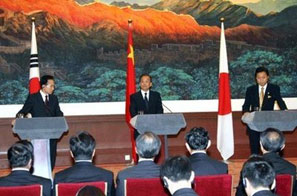Asia for fresh NK nuke talks
BEIJING: The leaders of China, Japan and South Korea on Saturday called for the quick resumption of talks on ending North Korea's nuclear drive, with Beijing saying the door was open to making real progress.
The leaders, who pledged to deepen regional cooperation, said they would work together to ensure the success of global climate talks in Copenhagen later this year and promote the development of clean energy technologies.
Chinese Premier Wen Jiabao, new Japanese Prime Minister Yukio Hatoyama and South Korean President Lee Myung-Bak also said they "remained committed" to the development of an East Asia community as a "long-term goal".
But finding a way to bring North Korea back to stalled six-party disarmament talks was clearly the focus of the summit, and Wen -- who visited Pyongyang just a week ago -- said the international community needed to seize the moment.
"We are faced with an opportunity, but this opportunity may slip by. The key is what we do. We need to seize the opportunity and make the most of it," Wen told a joint press conference.
"On the issue of the six-party talks, the DPRK side showed flexibility," he added, noting that Pyongyang "not only hopes to improve its relations with the United States, but also to improve relations with Japan and South Korea."
North Korea said Monday during Wen's visit to Pyongyang -- the first by a Chinese premier in 18 years -- that it was willing to return to six-party talks but only if it first was granted direct negotiations with the United States.
Washington has said it would agree to bilateral talks within the framework of the six-party disarmament forum, but that the goal must be a complete end to Pyongyang's nuclear weapons drive.
The six-way negotiations are hosted by China, a close ally of North Korea, and also include South Korea, the United States, Russia and Japan.
Wen, Hatoyama and Lee said they would push "with other parties for an early resumption of the six-party talks, so as to safeguard peace and stability in Northeast Asia" in a statement issued after their talks.
Both Lee and Hatoyama said they were encouraged by Wen's descriptions of Pyongyang's attitude.
"Premier Wen said North Korea was willing to have talks with South Korea. I welcome this," Lee told reporters.
Hatoyama added: "I would like to trust these words."
South Korea's Yonhap news agency reported on Friday that a key North Korean diplomat was likely to visit the United States later this month, which could provide a rare opportunity for face-to-face talks between the two sides.
Lee said he had presented what he describes as a "grand bargain" for North Korea's nuclear disarmament -- massive aid and diplomatic and security guarantees in return for a firm commitment to total denuclearisation.
"We agreed that it's important that the three countries cooperate on this issue," the South Korean president said.
Hatoyama backed Lee's approach, saying: "We stand on common ground."
The three leaders also committed Saturday to expand their cooperation "in the spirit of facing history squarely and advancing towards the future".
Hatoyama, who took office last month, is looking to erase the distrust and frequent animosity that marked Tokyo's relations with its neighbours under the previous Liberal Democrat leadership.
Chinese State Councillor Dai Bingguo said Friday that relations between Beijing and Tokyo were off to a "good start" under Hatoyama, state media reported.
As further proof of that, Chinese President Hu Jintao held a brief meeting with Hatoyama and Lee late in the day before a formal dinner, Japanese officials said.
On climate change, the three nations vowed to "work closely together... to contribute to the successful achievement of the Copenhagen conference" -- while maintaining that countries bore "common but differentiated responsibilities".
Wen, Hatoyama and Lee -- whose countries accounted for 16 percent of global GDP last year and have increasingly intertwined economies -- also said they would boost business and trade ties.






